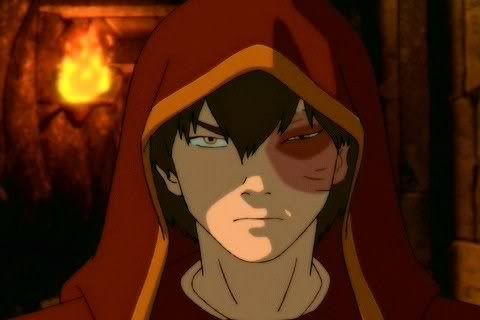
One thing that Avatar: The Last Airbender demonstrates along with good character development and a fully-realized world is momentum. After Book 2‘s climax, Aang and his friends find themselves in enemy territory. The Fire Nation is stronger than ever, and poised to bring the war to a victorious end when the comet arrives. Most interesting of all, however, is where this journey has taken the character of Prince Zuko.
Zuko spent the lion’s share of the first two seasons chasing Aang. The young Avatar represented his only hope of returning home and regaining his honor. Banished from the Fire Nation and scarred for his perceived weakness, his own tenacity and his uncle’s unwavering support were all that propelled him forward in his quest. And in the end, he was able to achieve his goals.
Yet, as Book 3 begins, Zuko seems more unhappy than ever. Despite the rewards, the accolades, and even the approval of his father, Zuko is troubled and conflicted. The opportunity the return home came with a high price. He had to turn on his uncle, trust his scheming sister, and go against his instincts when it came to Aang. It weighs heavily on the prince, and it is clear that he has chosen the wrong path. His struggle to find the right one is something to which many can relate, and one of the most compelling reasons to keep watching.
Zuko is also a microcosm for the Fire Nation itself. It would be easy to paint them as a monolithic, evil force. However, The Last Airbender‘s scribes are smarter than that. It’s ludicrous to believe that every member of a particular section of the world’s population all subscribe to the same ideology. While there is a certain amount of pride, loyalty, and tradition that goes with being a native of the Fire Nation, most of the people in it are just people. Even those who have or do serve in the war have families, people who love them, and things they fear.
Aang recognizes this. His own conflict comes with the notion of doing what must be done in order to end the war. Unlike Katara and Sokka, he sees the people and not its deeds, and even knows that Fire Lord Ozai, his ultimate foe, is a human being, and that taking the man’s life would diminish the world and lessen his own soul. He has just as much reason to hate the Fire Nation as anyone, considering their genocide of the Air Nomads, but Aang believes in going beyond that. He believes that the Avatar, and people in general, can and should be better than that.
After the somewhat slow and spotty start from Book 1 and the accelerating tension of Book 2, Book 3 only breaks pace once to my knowledge, and even then it gives us insight on the Fire Nation, underscores Aang’s inner conflict, and allows a brief breather before the breathtaking finale of the series. I picked up the graphic novels in “The Promise” storyline immediately after we finished watching Avatar: The Last Airbender, and spirits as my witness, we will find a way to watch Legend of Korra without paying through the nose.
We have no cable TV, you see. Merely the Internets.



Leave a Reply